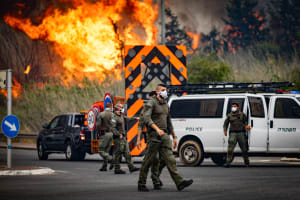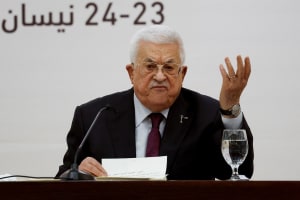Sister of former Israeli hostage Yarden Bibas shares what helped him survive Hamas captivity

Having survived the hell of captivity, Yarden Bibas is coming to terms with the fact that he and his family are now world famous, and that his wife and children have become something of an icon for the hostages on a scale he couldn’t have imagined.
Clearly, his life will never be the same. He expressed equal measures of amazement and amusement when he saw his sister Ofri, a vegan farmer, standing in public, giving statements to the press. Now Ofri Bibas shares with the world some of the details of what happened to her brother in captivity, and how he hung on to hope.
When asked about his well-being, Ofri responded that physically he was doing well. “Obviously, in his case, as we’ve seen, he walked out on his own feet, and although he lost a lot of weight, he is very strong. The main challenge will be psychological.” However, Yarden Bibas has proven remarkably resilient. “I am discovering strengths in him that I never imagined he had,” she said.
“I was really afraid of our meeting, of what he would ask and what I would tell him.” Speaking of the status of Shiri Bibas and the two children, Ofri Bibas said, “I was surprised to discover... he came out of there with the same understanding that we have today. He understands, like us, that there's a concern, a great concern, he understands, like us, that there's no certainty, but he holds onto hope. And in that sense, I didn’t have to explain much to him, because he already arrived at the same mindset we are in.”
Ofri Bibas relayed some of Yarden’s reactions to the events surrounding his release: “He told us that on the way from the car to the stage, they asked him to stop under the pictures of… Deif and Sinwar or something like that. They told him he had to stop there and wave, but he simply ignored them, walked straight to the stage, and took back some control over himself.”
Watching the live broadcast of the release from the Re'im base and listening to the commentary in the Israeli media, the family could see that Yarden’s demeanor was being misinterpreted.
“They presented him as tragic and analyzed his body language in such an incorrect way,” his sister explained. “We, his family, who know him, saw him coming out standing tall and strong, standing there and not cooperating with their show,” she said.
One of the first things Yarden asked to do was to pass on a message to the family of another hostage still in captivity after more than a year without contact.
“He was held with a soldier for a period, and he spoke with his father and passed along some messages. It gave the family a lot of strength. It was very important for him to do that,” said his sister, “and he did it that very same Saturday when he was released.”
Ofri relayed some of what Yarden had told them about his time in captivity. They spent most of their time in tunnels without daylight, and received almost no food until the hostage deal came into effect and their captors began to feed them in preparation for release.
He was held at different times with different hostages, but in recent months he had been together with Ofer Calderon, who was also kidnapped from Kibbutz Nir Oz.
“He was in tunnels underground, in conditions just as we imagine them—dark, mostly dark all day. There was some kind of lighting that worked intermittently. But it was dark, with little air, very humid and musty, and the mattress they slept on was moldy. He said they spent most of their time sleeping, that their sleep cycles completely changed, and really most of the day they passed by sleeping and they would even force themselves to sleep just to pass the time.”
Bibas shared that somehow her brother had kept his sense of humor, and that it helped him to survive the horrific conditions.
“From how he describes it, his way of coping with this horrific situation that they dealt with was through a lot of humor — which is very much Yarden. He found a way to try and get closer even to those who held him and connect with them through humor.”
Even though he had not been exposed to the media while in captivity, Ofri was surprised to find her brother had received a lot of information from his captors.
She told KAN news, “He came out with quite a good understanding of what happened here. He knew that people were evacuated from the north, that there was a war, and he even knew that Trump pushed for, that he was a significant factor in closing the deal. So there were many things, small details like these, that he knew that really surprised me because he was so well-informed.”
For those who endured captivity, questions about the Israeli military’s response have been a persistent concern. Ofri’s brother is no exception.
Now he is beginning to piece together what happened on Oct. 7 and grasp the magnitude of the massacre. Ofri explained, “He began to understand the full picture of what happened on October 7th. He didn’t necessarily know that after he was taken, the army never arrived. He discovered that here—that essentially, the army never reached Nir Oz.”
When asked if her brother was angry, Ofri responded, “He already had questions when he arrived."
The hostages thought about several things while in captivity such as where the army was, when did the IDF eventually arrive to their communities, and how did this whole thing happened to them.
"But coming here and truly discovering the disaster that took place and all the failures that occurred on that day—it’s... little by little, he is being exposed to it, and it is infuriating. Of course, it’s infuriating. His wife and children are still there," Ofri Bibas said.

Jo Elizabeth has a great interest in politics and cultural developments, studying Social Policy for her first degree and gaining a Masters in Jewish Philosophy from Haifa University, but she loves to write about the Bible and its primary subject, the God of Israel. As a writer, Jo spends her time between the UK and Jerusalem, Israel.
You might also like to read this:

















